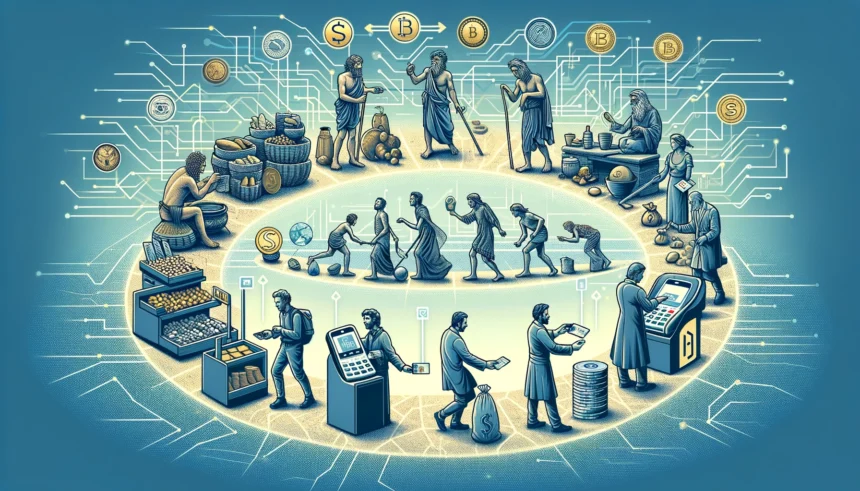In an era where the tap of a smartphone can finalize a transaction, the evolution of payment systems has transformed not just how we buy and sell, but fundamentally altered the landscape of global commerce. From the early whispers of digital transactions to the thunderous growth of mobile payments, blockchain technology, and the intriguing possibilities offered by artificial intelligence, the financial technology (fintech) sector has been at the forefront of this revolution. As we navigate through the complexities of modern-day transactions, including the ease of peer-to-peer transfers and the hurdles of regulatory frameworks, it’s clear that the journey of payment systems is far from over. With emerging trends constantly on the horizon, this article aims to explore the intricate tapestry of innovations that fintech has woven into the fabric of our daily lives, ensuring that your financial interactions are not just transactions, but a seamless part of your everyday experience.Copy HTMLCopy text
The Dawn of Digital Payments: A New Era Begins
The transition to digital payments has been nothing short of revolutionary, marking a significant shift in how transactions are conducted globally. This evolution has been driven by the relentless pace of technological innovation, particularly within the fintech sector. Experts agree that the convenience, speed, and security offered by digital payment systems have not only transformed consumer behavior but also opened up new avenues for businesses to thrive in the digital economy. The integration of advanced technologies such as blockchain and artificial intelligence has further enhanced the efficiency and reliability of these systems, paving the way for a more inclusive financial ecosystem.
At the heart of this transformation is the consumer’s growing preference for digital over traditional payment methods, a trend that has been significantly accelerated by the COVID-19 pandemic. Businesses and financial institutions have been quick to adapt, investing heavily in fintech solutions to meet this demand. Industry leaders emphasize the importance of such investments, noting that they not only improve customer satisfaction but also drive operational efficiencies. The ability to process payments instantly and securely, across borders, has opened up international markets to businesses of all sizes, fundamentally changing the landscape of global commerce.
The role of fintech in shaping the future of payments cannot be understated. As we move forward, the focus is increasingly on creating more personalized and seamless payment experiences. This involves leveraging data analytics and machine learning to understand consumer preferences and predict future trends. Experts predict that the next wave of innovation will likely include more integrated and interoperable payment systems, further blurring the lines between different financial services. The ongoing evolution of digital payments is a testament to fintech’s transformative potential, signaling a new era of commerce that is more dynamic, accessible, and secure.
Mobile Wallets and Apps: Revolutionizing Everyday Transactions
Exploring the landscape of modern commerce, it’s evident that mobile wallets and payment applications have significantly altered the way consumers interact with financial services. These platforms not only offer convenience but also enhance security and efficiency in transactions. A notable case study is the exponential growth of Apple Pay, which, since its inception, has transformed mobile payments into a seamless, ubiquitous part of everyday life for millions of users worldwide. This evolution underscores the critical role fintech has played in redefining the boundaries of digital commerce.
Amidst this transformation, emerging markets have not been left behind. In countries like India, mobile payment solutions such as Paytm have become instrumental in driving financial inclusion, bringing banking and payment services to the unbanked and underbanked populations. This has been achieved through innovative use of technology that simplifies transactions, making them accessible and affordable. Paytm’s journey from a mobile recharge app to a comprehensive fintech platform illustrates the dynamic nature of fintech’s impact on payment systems, highlighting the potential for further growth and innovation in this sector.
Furthermore, the integration of artificial intelligence and machine learning into mobile wallets and apps is setting new standards for personalized customer experiences. These technologies enable smarter fraud detection, tailored financial advice, and predictive analytics, thereby enhancing user engagement and trust. An example of this is Alipay’s use of AI to offer microloans and investment services, demonstrating the vast capabilities of mobile payment systems beyond mere transaction processing. This ongoing integration of advanced technologies signifies a future where fintech not only simplifies transactions but also enriches the financial lives of consumers globally.
Blockchain and Cryptocurrency: The Future of Secure Payments
As commerce continues to evolve at a breakneck pace, the integration of blockchain technology and cryptocurrencies is reshaping the landscape of secure payments. This innovative approach not only enhances transaction security but also introduces a level of transparency previously undefined in traditional financial systems. By leveraging decentralized ledgers, businesses and consumers alike benefit from reduced fraud, lower transaction fees, and faster settlement times. The inherent characteristics of blockchain, such as immutability and encryption, ensure that each transaction is securely recorded and easily verifiable, setting a new standard for payment processing in the digital age.
Adoption of these technologies is rapidly expanding beyond the realm of niche enthusiasts to mainstream markets, signaling a significant shift in how future transactions will be conducted. The role of fintech companies in this transition cannot be overstated; they are at the forefront of developing user-friendly platforms that integrate cryptocurrency payments into everyday commerce. This not only democratizes access to secure and efficient payment methods but also encourages innovation in a sector that has been ripe for disruption. As regulatory frameworks around the world begin to catch up with these advancements, the potential for blockchain and cryptocurrency to become the backbone of a new, more secure payment ecosystem is increasingly becoming a reality.
The Impact of AI and Machine Learning on Payment Technologies
Advancements in AI and machine learning are revolutionizing the way we approach payment technologies, offering unprecedented levels of efficiency, security, and personalization. These technologies are not just transforming the operational aspects of payment systems but are also enhancing the user experience by making transactions faster, more secure, and highly customized. Experts in the field emphasize the importance of leveraging AI to analyze vast amounts of data, which in turn helps in detecting fraudulent transactions with greater accuracy and in real-time, thereby significantly reducing the risk of financial losses.
One of the most significant contributions of AI in payment technologies is the development of predictive analytics. This allows financial institutions to offer personalized financial advice and product recommendations to their customers, based on their spending habits and transaction history. Experts advise that businesses should integrate these AI-driven insights into their payment systems to not only improve customer satisfaction but also to increase their competitive edge in the market. Furthermore, machine learning algorithms are constantly evolving, enabling systems to learn from new transactions and adapt to emerging fraud tactics, thus enhancing the security framework of digital payment platforms.
Moreover, the integration of AI and machine learning in payment technologies is paving the way for the advent of autonomous finance. This concept, which experts believe will be the future of financial transactions, refers to the ability of systems to conduct financial decisions and transactions on behalf of users, based on learned or predetermined preferences. This level of automation in payments, underpinned by robust AI algorithms, not only streamlines the transaction process but also ensures a high degree of accuracy and security, minimizing human error. As we move forward, the role of AI in shaping the future of payment systems cannot be overstated, with experts advising companies to invest in these technologies to stay ahead in the rapidly evolving digital commerce landscape.
Peer-to-Peer Payment Systems: Simplifying Money Transfers
Peer-to-Peer (P2P) payment systems have revolutionized the way we think about financial transactions, offering a streamlined and user-friendly approach to transferring money. Experts in the field emphasize the importance of security and ease of use as critical factors driving the adoption of these platforms. With the advent of fintech innovations, P2P payment systems have become more than just a convenience; they are now a fundamental component of digital commerce, enabling instant transactions without the need for traditional banking intermediaries. This shift not only enhances user experience but also fosters a more inclusive financial ecosystem, allowing individuals to manage their finances with unprecedented flexibility and efficiency. As these systems continue to evolve, the focus on integrating advanced security measures and improving user interface will remain paramount, according to industry leaders.
Regulatory Challenges and Opportunities in the Fintech Space
Fintech innovations have significantly transformed the way financial transactions are conducted, yet they also bring forth a unique set of regulatory challenges and opportunities. One of the most pressing issues is the need for a regulatory framework that can keep pace with technological advancements. This is crucial for protecting consumers, ensuring fair competition, and fostering innovation. Regulators are tasked with the delicate balance of preventing financial crimes such as fraud and money laundering, while also providing room for fintech companies to innovate and grow. The dynamic nature of fintech means that regulations must be both robust and adaptable.
Opportunities within the regulatory landscape are abundant, particularly in the collaboration between fintech companies and traditional financial institutions. This partnership can lead to the development of new regulatory technologies (RegTech) that can enhance compliance processes and reduce costs. For instance, the implementation of blockchain technology can offer transparent and secure transactions, which can aid in the fight against financial crimes. Moreover, the use of artificial intelligence in monitoring and analyzing transactions can provide regulators with powerful tools to detect irregularities more efficiently.
Addressing the regulatory challenges in the fintech space involves several key steps:
- Developing a clear regulatory framework that is specific to fintech, which can provide clarity and certainty for all stakeholders.
- Encouraging collaboration between fintech companies, traditional financial institutions, and regulatory bodies to share knowledge and best practices.
- Investing in RegTech solutions to streamline compliance processes and enhance the ability to monitor and respond to risks.
These measures can help in creating a regulatory environment that supports innovation while ensuring the financial system remains secure and trustworthy.
The Road Ahead: Emerging Trends in Payment Solutions
With the rapid evolution of technology, the future of payment systems is poised for significant transformation. Fintech’s role in shaping commerce has never been more critical, as businesses and consumers alike demand faster, more secure, and more convenient payment methods. Among the most promising developments are:
- Blockchain technology – Offering unparalleled security and transparency, blockchain is set to revolutionize how transactions are processed.
- Biometric authentication – Enhancing security and user experience by using unique biological traits for verification.
- Smart contracts – Automating and streamlining payment processes in a trustless environment.
Consumer expectations are driving the push towards more integrated and seamless payment experiences. The rise of omnichannel shopping has necessitated the development of payment systems that can operate flawlessly across various platforms. This integration extends beyond mere transaction processing, encompassing comprehensive payment solutions that offer predictive analytics, fraud detection, and personalized customer experiences. The goal is to create a frictionless payment environment that enhances the overall shopping experience.
Looking further into the future, the potential for AI nd machine learning to transform payment systems is immense. These technologies can predict and prevent fraud in real-time, offer personalized banking advice, and automate customer service interactions. Moreover, the advent of 5G technology promises to accelerate these advancements, enabling faster, more reliable mobile payments. This convergence of technology will not only redefine the commerce landscape but also offer unprecedented opportunities for businesses to innovate and for consumers to enjoy more convenient and secure payment options.




